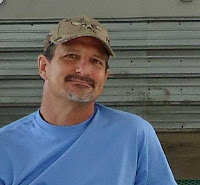We’re interested in getting to know the faculty of the Division of Theatre and Dance a little better, so we asked them a few questions. Here’s what we learned from Professor David A. Miller who teaches acting, directing and scriptwriting at Bloomsburg University.
 |
| The Robot Inventor (Then) |
What first got you interested in theatre?
My first experience seems to be acting in skits in Cub Scouts. I recently rediscovered a photo of one of those. In the skit I played a Robot Inventor. Like all Cub Scout skits, it was a comedy. As my colleagues and students can attest, my interest in comedy has not diminished since that fateful Pack Meeting performance oh so many years ago.
What made you want to teach theatre?
I have always loved working with young people in a teaching or mentoring capacity. From an early age I was a babysitter. In Scouts I was regularly a leader. In grade school I wanted to be either a teacher or a professional soccer player. By the time I reached undergraduate I had dreams of teaching theatre at the college level. But there was something particularly special that happened during undergrad: When searching for a summer job I saw a posting for a part time teacher to teach visual arts and drama to 8 to 11 year old students. I was amazed at the prospect of teaching arts to young people. I don't know that I believed before that moment that I might be able to create a career teaching theatre and visual art. That was turning point for me in my marrying of my two passions of teaching and the arts.
What is your most memorable theatre experience?
Perhaps my most memorable experiences, or at least the most unique, was when I served as an understudy for a professional production in Seattle. As an actor, the job of being an understudy is fascinating and potentially nerve wracking. The understudy is the "back up" for a role or for multiple roles. The actor has to learn those roles—the lines, the stage business—and be ready to go on at a moments notice if the actor in the role cannot, for whatever reason, perform.
For this production, Kenny's Window at Seattle Children's Theatre, it was unlikely that I was going to be called to perform. The actors I was understudying were notoriously sturdy in their health and work ethic. However, I got the call on a Sunday afternoon. (Actually, I got the page, then called back, as this was in the pre-cell phone era.) It was 20 minutes before the matinee was to begin and stage management could not get a hold of one of the actors and they could not get a hold of his understudy. I grabbed my script and ran to the theatre which was thankfully only blocks from my apartment. While wardrobe fitted the Soldier's costume to my body I rehearsed lines with the other Soldier and talked through how he would help me while we were on stage. I had seen these scenes in rehearsal, but I had never rehearsed them myself. We performed the first act with a script in my hands and my fellow Soldier whispering directions to me ("Stay here." "Sit on the bed.") By intermission the other understudy had been contacted, so I got out of the costume and he got into it to perform the second act. We came out together for the curtain call.
What is one show you would love to work on?
There are so many great plays and musicals out there... These days I am thinking a lot about the plays of Eugene O'Neill. Pig Farm by Greg Kotis is on my list. Some day I would love to direct the play Spring Awakening. There's a slew of playwrights creating new work with whom I would love to collaborate, including Brenda Withers, Erin Mallon, Catherine Weingarten.
 |
| Now |
Who would you love to work with?
There are several directors who I would love to assist. They include Ivo Van Hove, Katie Mitchell and Arin Arbus. Their work is always so clear and so compelling. I would love to be part of their process to learn more about how they approach a play script and how they work with actors and designers.
David A. Miller is a professional director, playwright and educator. He is Resident Director at Amphibian Stage Productions (Fort Worth, TX), a member of Stillwater Writers (New York, NY) and former Artistic Director of The Artful Conspirators (Brooklyn, NY). mrdavidamiller.com











